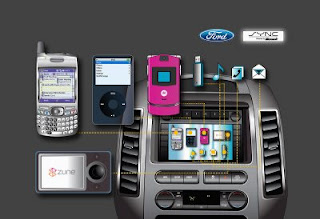Microsoft to Announce Another Major Automaker Partner by End of 2008
By Chris Haak
02.21.2008
 Ford’s popular SYNC system, which allows simple voice-activated integration of cell phone, iPod, and other electronic devices with its cars, was developed by Microsoft. Part of Ford’s deal with Microsoft was that Ford had exclusive rights to the software for 18 months, but Microsoft is free to offer it to other automakers at the end of 2008. Microsoft also has provided a system similar to SYNC to Fiat (which, having been on the market since 2006, actually predates its cooperation with Ford).
Ford’s popular SYNC system, which allows simple voice-activated integration of cell phone, iPod, and other electronic devices with its cars, was developed by Microsoft. Part of Ford’s deal with Microsoft was that Ford had exclusive rights to the software for 18 months, but Microsoft is free to offer it to other automakers at the end of 2008. Microsoft also has provided a system similar to SYNC to Fiat (which, having been on the market since 2006, actually predates its cooperation with Ford).
According to the Detroit Free Press, the general manager of Microsoft’s automotive business unit, Martin Thall, said that Microsoft plans to announce a deal to utilize a system similar to SYNC with another major automaker’s vehicles. He did not indicate which manufacturer it would be or whether it would be one that sold vehicles in the US.
For its part, Microsoft gives credit to Ford for being an early supporter of the technology, which has proven popular with consumers. Last year, over 30,000 vehicles equipped with SYNC were sold, and Ford expects over one million SYNC-equipped vehicles to be on the road by early 2009.
Aside from working with automobile manufacturers, Microsoft also is working on adding new features to its software. These include tighter integration of things such as real-time traffic, navigation, and point-of-interest-directories; Fiat is adding something called Ecodrive to its system, which will provide feedback to drivers about how they can reduce their environmental impact. (I’m guessing it will be a lot of “please slow down” and “don’t brake so hard.” I don’t need a computer to tell me those things, since I have a wife!)
In the more distant future, Microsoft would like to add advertising relevant to a user’s current location. I can see why Microsoft would love to get their hands into that area, but as a consumer, I feel that our society is already way oversaturated with advertising; it’s bad enough that companies are chomping at the bit to show ads on cell phones (and next time you’re at a professional sports game, look around you at all the advertisements), but to start encroaching on navigation displays under the guise of “providing a service” is personally offensive to me. Of course, if SYNC without advertisements was $395 and with advertisements was $195, then I’d be OK with the concept – or, if the system allowed the driver to disable the advertising functionality, with the understanding that ads the driver might find relevant would no longer be displayed, I wouldn’t have as much of an issue with the concept.
The convergence and simplicity of the SYNC system is definitely the future of in-vehicle electronics, and I’m glad that SYNC is forcing other automakers to either join the Microsoft bandwagon or (like in the 2008 Cadillac CTS) to invent competitive systems with similar functionality.
COPYRIGHT Full Metal Autos – All Rights Reserved




